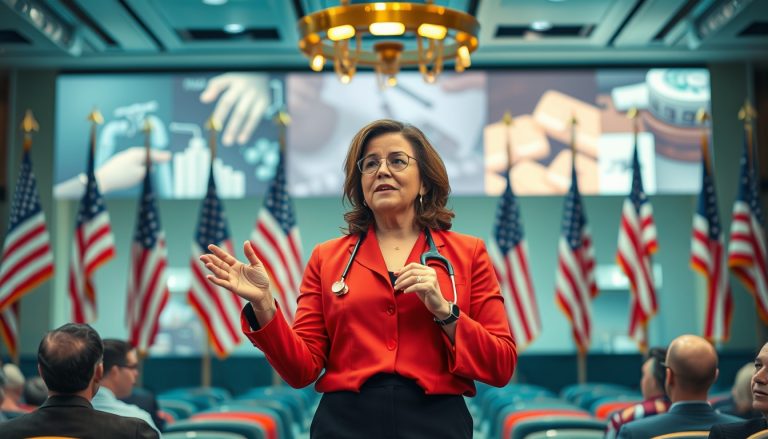In a bold move aimed at revitalizing American pharmaceutical research, FDA Commissioner Marty Makary has put forth a proposal to reform drug user fees in alignment with the ‘America First’ policy initiated during the Trump administration.
This initiative seeks to shift the paradigm of clinical trials from overseas to the United States, thereby asserting the importance of domestic research integrity and reliability in drug approval processes.
With the increasing global competition in pharmaceutical development, Makary’s advocacy for increased user fees for companies conducting trials outside the U.S.
aims to incentivize innovation on American soil, enhancing both the pharmaceutical landscape and public health outcomes.

Key Takeaways
- Marty Makary proposes higher drug user fees for trials conducted outside the U.S. to encourage domestic research.
- Renegotiation of drug fees aligns with the ‘America First’ policy to boost local drug development.
- Makary raises concerns about the reliability of data from international clinical trials, particularly from China.
Introduction to ‘America First’ Drug User Fee Reforms
In recent discussions surrounding drug approval processes, FDA Commissioner Marty Makary has put forth a compelling argument for revisiting the drug user fee structure under the principles of the ‘America First’ policy.
This initiative aims to incentivize pharmaceutical companies to conduct their clinical trials domestically rather than outsourcing them to countries like China.
By imposing higher fees on companies that opt for foreign trials, the strategy seeks to funnel research and development efforts back into the United States.
Makary’s position is driven by a concern for the reliability of data derived from international studies, as he raises questions about the integrity of trials conducted outside the US compared to those performed at home.
The push for reform not only highlights the significance of maintaining high standards in drug approvals but also emphasizes the broader implications of nurturing a robust domestic pharmaceutical industry.
As the FDA considers these reforms, the conversation about the effectiveness and accountability of drug development processes remains at the forefront of America’s public health agenda.
Impacts on Domestic Research and Drug Approval Integrity
One of the key arguments presented by Commissioner Makary is that conducting clinical trials domestically ensures a more stringent oversight on compliance with US regulations, potentially leading to more trustworthy outcomes.
He contends that data obtained from foreign trials may not always align with the health and safety standards upheld in the United States, creating challenges in evaluating their validity.
This skepticism is fueled by past instances where disparities in regulations between nations have raised questions about the ethical conduct of trials abroad.
Makary’s proposal, therefore, emphasizes the importance of bringing clinical research back to American soil, which he believes will not only fortify the drug approval process but also foster innovation within the U.S.
pharmaceutical sector, ultimately leading to safer, more effective medications for the American public.















